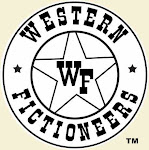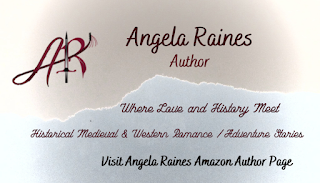Spur Award winner John Nesbitt is on tap to share his writer's journey. It's always interesting how early life or just that one someone can set you on a path. As we head into the new year, yes, it's not that far away, take a lesson from John and follow that path.
 |
| John D Nesbitt |
When did you realize you wanted to be a writer? I am not sure when I realized I wanted to be a writer, but I think it was at a pretty early age. I was good at all subjects in school, so I had concurrent aspirations such as writing for publication and making mathematical discoveries. I made a career decision of wanting to study literature and the practice of writing when I was in my first year of college.
Did you choose the genre you write in or did it choose you?
I think the genre chose me, in that I grew up in the western way of life. My father was a farmer and rancher before he went broke and we took to working in the fields. I write contemporary, retro, and Old West fiction, but it is all about life in the American West as I know it.
What was the nudge that gave you faith that you could and wanted to be published?
When I was in the eighth grade, our class produced a mimeographed collection of poems by the class. When I was in the tenth grade, the English teacher used to post what she selected as the best work on a bulletin board for others to read, and I had a couple of pieces posted there. Both of these experiences gave me the feeling that my work had been read by others and was, in a way, published.
Do your life experiences influence or hinder your writing?
My life experiences influence my writing in a constructive way, as I write about things I know about. For example, I worked in the fields when I was younger, and I have written some successful pieces set in the world of field labor. Also, my experience in farm work, ranch work, hunting, camping, and living in the country have helped me write contemporary and Old West stories.
Where did you get the idea for your latest release and tell a bit about the story?
I have two works coming out close together, a novel and a novella. I will talk about the novella here because the idea for it came in a more definite way than with some works. The novella is entitled “Double Deceit,” and it is a frontier mystery featuring my series character named Dunbar. In this story, Dunbar comes to a locale and exposes a quack doctor who was a priest many years earlier and was suspected of murdering a young woman after hearing her confession and then raping her. For several years, I had notes in a folder about a case in Texas in about 1960 in which a young priest had done as mentioned above but had been protected by the church and by local law enforcement. Fifty years later, the man was sarcastic with interviewers, but I am glad to say that he was finally brought to justice. After casting around for a long time for a storyline in which to use some of this material, I landed on the Dunbar story, as Dunbar pursues crimes of this nature. In my story, the perpetrator not only gets away with his earlier crime for many years but goes on to masquerade as a doctor before he is exposed. This aspect of the story comes out of my interest in frauds in general, as I have known a few professional frauds and have known of others.
Are you a plotter or a pantser?
I am a plotter. I work up a pretty good set of notes, but I am always open to changing things as the story takes its course.
Is there a writing routine you follow or do you write when the muse strikes?
I work on a storyline at all sorts of times, in and around other tasks and projects. When I work on the manuscript itself, I try to get started by 8:00 in the morning, and I try to get in four or five hours of writing. I write in longhand. In the afternoon or evening, I type what I have written. Sometimes I write more on the same day and get caught up on the typing before long. So my first typed draft is more like a second draft. When I go back through the whole thing, then, I am working on my third draft.
If you had a choice, which is your favorite to write, short stories, novellas or full-length novels?
I like to write at every length, and I like to keep up at all of them. Story ideas seek their own length, so when I have time to work on a story of a certain length, I do that.
Do you ‘interview’ your characters before or at any time while telling their story and what do you do it they don’t cooperate with your story idea?
I try to let my characters fulfill their roles in the story. At the same time, they live in the story, and so their existence is defined by that.
Is there a process where you find your next story or does the idea just hit you?
As I mentioned in topic 5, I keep notes for story ideas. Some ideas accumulate for quite a while. When I am working on a storyline, sometimes I have to ask questions on paper and answer them. All of this communication with myself gets scrapped when I type up the storyline itself.
Is there anything else you feel people would like to know or would be surprised to learn about you?
I once took second place in a “Dare To Be Dull” contest.
Do you write in other genres?
As mentioned above, I write Old West, retro, and contemporary fiction, and I write crossover western/mystery. I also write nonfiction of a few different kinds. I have written quite a few autobiographical pieces, some of which have placed in contests, and I hope to do more in this area. I have written several pieces about hunting, and I may bring them together in a collection. I have written textbook/course manuals for my college courses, and I have written one book on fiction writing for writers in general. I have also written about other authors and their works. I have written quite a few poems and have won some nice awards there, and I have written song lyrics. One of my songs is on a CD by Carol Markstrom, and W.C. Jameson arranged and recorded a CD of twelve songs for which I wrote the lyrics.
What are your favorite areas of research and why they are important to you?
I like to research Wyoming history because much of it (such as the abuses of power) is still pertinent today. I like to research other authors and primary works because it is good for me to know about the genres I hope to work in and about literature in general.
When do you start to ‘market’ your new released?
I am a bit superstitious, so I do not like to talk about something until it is pretty definite. For me, that point occurs when the cover is out and available to be seen by the public. Even then, there have been a couple of significant delays which have made the promotion seem dragged out.
What advice would you give to those who dream of writing, or what advice would you give your younger self?
One piece of advice I would give to aspiring writers is to learn as much as possible and to learn in person when it is possible. This means to read and to discuss ideas with other people, including people who know a great deal about writing. Another piece of advice I would give is to be persistent and to be willing to take advice, whether it is on the sentence level, on the level of narrative technique, or on the level of career management.
Are there authors you grew up with or inspired you to take pen to paper?
In addition to having a traditional public school education in which we were encouraged to read and write, I have had a good education in literature and languages. My sources of inspiration are broad and diverse.
If it were possible would you choose to go forward in time or back?
I think it would get me in trouble.
How do you or did you balance work and writing?
For many years when I was a college instructor, I always tended to my salaried work, which meant that I often had to read for class or grade papers in the evenings or on weekends. I worked on my writing in the evenings, on weekends, and during breaks. Sometimes I would write a novel during the school year, but more often, I would work on shorter things, such as stories, poems, articles, and personal essays, as well as story ideas for longer works. I would often write a novel during summer break. I just punched my ticket at my academic position, after forty years at Eastern Wyoming College and several years of part-time and limited-term positions before that, so I am just now getting a sense of what this new era is like. So far, it is like a longer summer break. I start out every day working on writing tasks and projects.
For more on John and his work, check out the links below:
https://johndnesbitt.com/
Amazon Author Page - John D Nesbitt











































